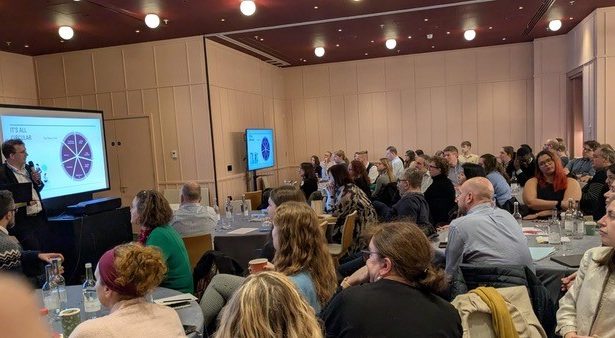Demystifying infectious intestinal disease; My PhD placement in food safety policy

Sam Mellor, a third year PhD student in Professor Alison Mather’s group studying bacterial genomics and antimicrobial resistance genes on retail foods and recently completed his placement at the Food Standards Agency, where he worked on uncovering the burden of infectious intestinal disease in the UK and science career options outside of academia.
The Food Standards Agency (FSA) is the government agency responsible for food safety and hygiene in England, Wales and Northern Ireland. Their mission is “food you can trust”, ensuring the food we buy and eat is safe and what it says it is.
Sam tells us about his unique experience demystifying infectious intestinal disease as part of the Microbiological Risk Assessment team.
Why choose a placement at the Food Standards Agency?
“The idea of doing a PIPS in government spoke to me; I knew this was an opportunity I wanted to explore career-wise. My PhD project is partly funded by the FSA, and there is an FSA contact on my PhD supervisory team, so I was aware the opportunity was available,” explains Sam.
There were different options to choose from, but Sam’s decision was made. He adds, “I looked around for other roles, but working at the FSA made the most sense to me. I wanted to use the PIPS experience to explore what career options would be available for me post-PhD, while still leveraging my food safety experience.”
Understanding the burden and causes of foodborne infectious intestinal disease in the UK
Sam worked on infectious intestinal disease (IID) in his placement. “The FSA aims to better understand the burden of food-related intestinal disease as a component of overall IID,” says Sam.
IID, also known as gastroenteritis, is caused by microbes that find their way into our guts. This can happen when the food we eat or the water we drink is contaminated with these disease-causing microbes. Symptoms usually present as diarrhoea and vomiting.
To better understand IID and its causes, the FSA commissioned the UK-wide Infectious Intestinal Disease 3 (IID3) study. “It’s a ‘study of studies’: one large project comprised of multiple smaller ones. The FSA are generating top-level data about how many people are getting ill,” Sam reveals.
Sampling is being carried out across the surveillance pyramid for public health. This pyramid refers to the different levels of disease surveillance, “from people reporting to GPs with illness, to those referred for testing and to the results that end up in national databases for tracing outbreaks,” Sam explains.
Studying food-related IID can be done using outbreak data, based on the number of food-specific outbreaks. The FSA also conducts systematic literature reviews of previous attribution studies. Systemic literature reviews are thorough and structured reviews of work and attribution studies are studies that link microbes to specific food sources. The data from these reviews can then inform disease modelling.
Beyond bacteria: studying microbes outside my PhD associated with infectious intestinal disease
“In academia it’s easy to get married to your ‘bug of choice’ – the one you study. I focus on bacteria in my PhD, so the placement was an opportunity to build my knowledge on other pathogens like parasites and viruses,” Sam reflects.
“In my PIPS I reviewed four microbes (Hepatitis A virus, Toxoplasma gondii, Sapovirus and enteropathogenic E. coli), shortlisted from a list of 20 that fall under the scope of IID3 and other ongoing FSA studies”, Sam explains.
These microbes are varied:
Hepatitis A virus is generally rare in the UK, though transmission via food is becoming an increasing public health concern. Its main symptom is jaundice, where skin takes on a yellowish colour.
Toxoplasma gondii is the parasite that causes toxoplasmosis. This is a common infection that usually doesn’t cause any symptoms but can lead to serious birth defects in babies if passed on from pregnant mothers in the womb. It is spread by eating undercooked meat.
Sapoviruses can be spread by eating undercooked shellfish like oysters and clams. Common symptoms include vomiting and diarrhoea, lasting a week on average.
Enteropathogenic E. coli is a type of bacteria that can make you ill, often with diarrhoea. Washing your hands well helps prevent infection.
Sam reminds us that the bigger picture is important from a public health perspective, “It’s worthwhile remembering there are a whole slew of other microbes to explore. The amount of data that the government has is just the tip of the iceberg in terms of what’s going on in the country.”
Life after PhD: career options in food safety
Working at a government agency was new to Sam. “I learnt that I could take on a scientific role without being in academia. This was reassuring when thinking about my future career,” Sam highlights.
He adds, “I am interested in public health and this experience has showed me how FSA functions within that space. I understand how fulfilling scientific work can be outside of academia.”
“I enjoyed working with my team, comprised of 14 people, spread out across the country. I was based in South Wales, so there was great flexibility,” Sam highlights.
Advice for PhD students thinking about their placements
Sam says, “Get work experience outside of academia for your PIPS. I’d recommend choosing a topic you’re interested in and exploring what industry and government options are available.”
He concludes, “For me, choosing the FSA was a career-based decision. Thinking about how your placement can serve you longer-term is useful. The PIPS placement is a great opportunity to diversify your CV in whatever way you want.”
Read Sam’s Food Standard Agency report “Disease Attribution to Foods for Four UK Pathogens”
